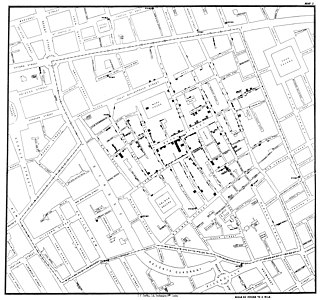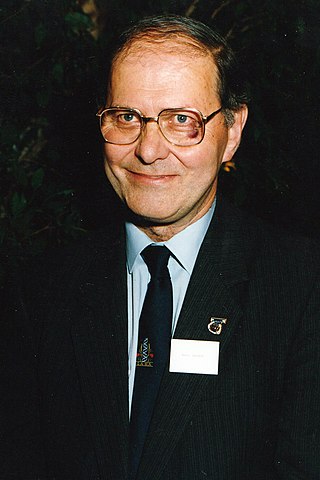
Human geography or anthropogeography is the branch of geography which studies spatial relationships between human communities, cultures, economies, and their interactions with the environment, examples of which include urban sprawl and urban redevelopment. It analyzes spatial interdependencies between social interactions and the environment through qualitative and quantitative methods.
Social geography is the branch of human geography that is interested in the relationships between society and space, and is most closely related to social theory in general and sociology in particular, dealing with the relation of social phenomena and its spatial components. Though the term itself has a tradition of more than 100 years, there is no consensus on its explicit content. In 1968, Anne Buttimer noted that "[w]ith some notable exceptions, (...) social geography can be considered a field created and cultivated by a number of individual scholars rather than an academic tradition built up within particular schools". Since then, despite some calls for convergence centred on the structure and agency debate, its methodological, theoretical and topical diversity has spread even more, leading to numerous definitions of social geography and, therefore, contemporary scholars of the discipline identifying a great variety of different social geographies. However, as Benno Werlen remarked, these different perceptions are nothing else than different answers to the same two questions, which refer to the spatial constitution of society on the one hand, and to the spatial expression of social processes on the other.
Michael J. Watts is Professor Emeritus of Geography at the University of California, Berkeley. He retired in 2016. He is a leading critical intellectual figure of the academic left.

David W. Harvey is a British Marxist economic geographer, podcaster, and Distinguished Professor of anthropology and geography at the Graduate Center of the City University of New York (CUNY). He received his PhD in geography from the University of Cambridge in 1961. Harvey has authored many books and essays that have been prominent in the development of modern geography as a discipline. He is a proponent of the idea of the right to the city.
Chris Philo FAcSS is Professor of Geography at the Department of Geographical and Earth Sciences, the University of Glasgow.

Sir Nigel John Thrift is a British academic and geographer. In 2018 he was appointed as Chair of the Committee on Radioactive Waste Management, a committee that gives independent scientific and technical advice on radioactive waste to the UK government and the devolved administrations. He is a visiting professor at the University of Oxford and Tsinghua University and an emeritus professor at the University of Bristol. In 2016 and 2017 he was the executive director of the Schwarzman Scholars, an international leadership program at Tsinghua University in Beijing. He was the Vice-Chancellor of the University of Warwick from 2006 to 2016. He is a leading academic in the fields of human geography and the social sciences.
The quantitative revolution (QR) was a paradigm shift that sought to develop a more rigorous and systematic methodology for the discipline of geography. It came as a response to the inadequacy of regional geography to explain general spatial dynamics. The main claim for the quantitative revolution is that it led to a shift from a descriptive (idiographic) geography to an empirical law-making (nomothetic) geography. The quantitative revolution occurred during the 1950s and 1960s and marked a rapid change in the method behind geographical research, from regional geography into a spatial science.
Critical geography is theoretically informed geographical scholarship that promotes social justice, liberation, and leftist politics. Critical geography is also used as an umbrella term for Marxist, feminist, postmodern, poststructural, queer, left-wing, and activist geography.
Gerard Toal is Professor of Government and International Affairs at Virginia Polytechnic Institute and State University.
William Wheeler Bunge Jr. was an American geographer active mainly as a quantitative geographer and spatial theorist. He also became a radical geographer and anti-war activist in the US and Canada.

Antipode: A Radical Journal of Geography is a peer-reviewed scientific journal published five times per year by Wiley-Blackwell and produced by The Antipode Foundation. Its coverage centers on critical human geography and it seeks to encourage radical spatial theorizations based on Marxist, socialist, anarchist, anti-racist, anticolonial, feminist, queer, trans*, green, and postcolonial thought. Originally inspired by the social justice movements of the 1960s, the journal supports progressive causes through the work of the Antipode Foundation, a UK registered charity. Antipode is also known for its online "Interventions", its book series, and its diverse workshops and lectures. The chief co-editors are Sharad Chari, Tariq Jazeel, Katherine McKittrick, Jenny Pickerill and Nik Theodore.
Noel Castree FAcSS is a British geographer whose research has focused on capitalism-environment relationships and, more recently, on the role that various experts play in discourses about global environmental change. He is currently at the University of Manchester. He is also the editor-in-chief of the peer-reviewed journal Progress in Human Geography.

Peter Haggett is a British geographer and academic, Professor Emeritus and Senior Research Fellow in Urban and Regional Geography at the School of Geographical Sciences, University of Bristol.
Dame Sarah Jane Whatmore is a British geographer. She is a professor of environment and public policy at Oxford University. She is a professorial fellow at Keble College, moving from Linacre College in 2012. She was associate head (research) of the Social Sciences Division of the university from 2014 to 2016, and became pro-vice chancellor (education) of Oxford in January 2017. From 2018 she has been head of the Social Sciences Division.
Reginald George Golledge was an Australian-born American Professor of Geography at the University of California, Santa Barbara. He was named Faculty Research Lecturer for 2009. During his career he wrote or edited 16 books and 100 chapters for other books, and wrote more than 150 academic papers.

Eric Sheppard is a British and American geographer, and Professor of Economic geography at UCLA.
J. Richard Peet is a retired professor of human geography at the Graduate School of Geography at Clark University in Worcester MA, USA. Peet received a BSc (Economics) from the London School of Economics, an M.A. from the University of British Columbia, and moved to the USA in the mid-1960s to complete a PhD in Geography from the University of California, Berkeley. He began teaching at Clark University shortly after completing his PhD from Berkeley, remained there for over 50 years, with secondments in Australia, Sweden and New Zealand.

Jamie Peck FRSC FAcSS is Canada Research Chair in Urban & Regional Political Economy and Professor of Geography at the University of British Columbia, Canada. He is the Managing Editor of Environment and Planning A and the convenor of the Summer Institute in Economic Geography.

Michael Storper is an economic and urban geographer who teaches at the University of California (UCLA), Sciences Po and London School of Economics.
Adam Tickell FAcSS is a British economic geographer, whose work explores finance, English local governance, and the politics of ideas. He is Vice-Chancellor of the University of Birmingham, and was formerly Vice-Chancellor of the University of Sussex. He also edited the Transactions of the Institute of British Geographers.








